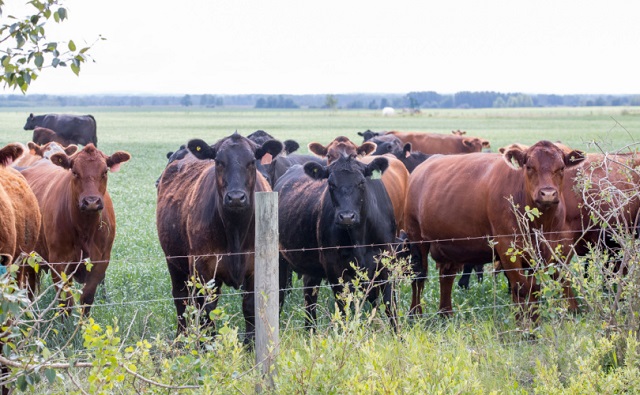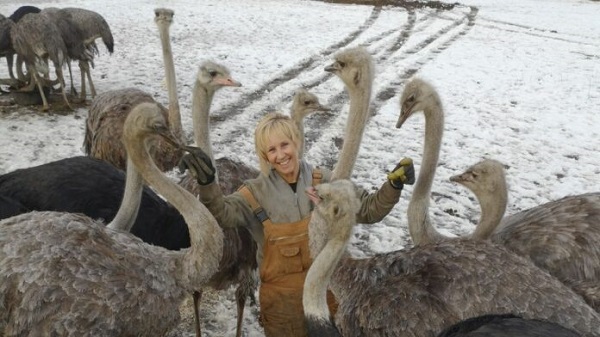Agriculture
Alberta premier slams Trudeau gov’t for ‘ridiculous’ attempt to regulate cattle emissions

From LifeSiteNews
Danielle Smith said she is in disbelief that limiting cattle farts and burps is an important issue and warned that restrictions could lead to food shortages.
The Premier of Canada’s largest beef-producing province blasted what she said is a “ridiculous” new Liberal federal government climate policy that aims to incentive beef cattle ranchers to reduce how much gas their cows emit by giving them feed additives.
After first attacking Canada’s oil and gas industry a few weeks ago, Prime Minister Justin Trudeau’s Environment Minister Steven Guilbeault announced at the United Nations’ “climate change” COP28 conference in Dubai a few days ago a draft version of Reducing Enteric Methane Emissions from Beef Cattle protocol.
The Trudeau government claims that farmers who participate in the program will get green credits they can sell off to other companies if they can reduce the amount of methane their cows emit, which they say can be done by giving cattle feed additives.
Alberta Premier Danielle Smith said that she was in disbelief the Trudeau government is attacking beef products and food in general.
“Incredibly, this is actually real,” Smith posted Monday on X (formerly Twitter).
“How is going after ranchers and dairy farmers a priority of this federal government? Completely ridiculous.”
Should beef cattle farmers go along with Trudeau’s plan, it would add extra costs that would lead to higher food prices and possibly food shortages.
Cows fed a diet richer in corn silage can reduce how much methane an animal emits; however, this adds costs.
As a natural course of digestion, as will all animals and humans, cows produce methane gas as a byproduct. Methane quickly breaks down in the atmosphere, but the Trudeau government says 31% of emissions from it come from beef and dairy cattle.
For now, the program is aimed just at beef cattle but could be extended to dairy livestock in the future.
The only other alternative for Canadian farmers to reduce the amount of gas their animals produce is to cull their herds, which does not seem to be on the table but has occurred in other nations.
Cattle farmers in Ireland and the Netherlands have faced actual forced reduction cuts in their herd size via government mandates.
Smith said Guilbeault’s plan to try and stop cows from farting and burping is a “new low.”
“Some astute journalists have flagged that the Federal government’s bizarre cow emissions announcement calls for using chemical additives to reduce methane emissions. A new low for the eco-extremists,” she wrote on X (formerly Twitter).
Guilbeault’s new incentives in trying to stop cows from farting and burping are just the latest in a series of his climate change announcements.
Earlier at COP28, he unveiled a plan to slash oil and gas emissions by 35%-38% below 2019 levels. He claimed that it is important to reach “carbon neutrality in Canada by 2050.”
Smith blasted him as a “menace” for going after her province and the oil and gas industry in general and vowed to fight him with every tool available to her government.
Last week, she warned the federal government under Trudeau to “watch” her over how she will shield her province from economic damage and high fuel prices after the feds announced Guilbeault’s plan to cut oil and gas production by a third by 2030 via an “emissions” reduction scheme.
‘Globalist’ has master plan to control food supply and force people to eat ‘bugs,’ says notable doctor
In a recent opinion piece posted to LifeSiteNews, Dr. Joseph Mercola noted how if “government and corporate entities are able to take control of the land, they can control the food supply and, with it, the people.”
“Ultimately, the war against farmers is a war on the whole of humanity, one that threatens what it means to be free,” he wrote.
Mercola noted how “Globalists suggest eating bugs will protect the planet by eliminating the need for livestock, cutting down on agricultural land use and protecting the environment.”
He highlighted the United Nations Food and Agriculture Organization, which encourages the consumption of insects and insect-based foods, as an example.
Mercola also observed how Epoch Times reporter Roman Balmakov stated in his “No Farmers, No Food: Will You Eat the Bugs?” show that “The people in charge of some of the most powerful organizations on the planet have determined that agriculture, specifically animal agriculture, is to blame for global warming, and global warming is to blame for the high prices of food as well as food shortages.”
Trudeau’s current environmental goals are in lockstep with the United Nations’ “2030 Agenda for Sustainable Development” and include phasing out coal-fired power plants, reducing fertilizer usage, and curbing natural gas use over the coming decades, as well as curbing red meat and dairy consumption while promoting people eat ‘bugs” instead.
The reduction and eventual elimination of the use of so-called “fossil fuels” and a transition to unreliable “green” energy has also been pushed by the World Economic Forum (WEF) – the globalist group behind the socialist “Great Reset” agenda – an organization in which Trudeau and some of his cabinet are involved.
Agriculture
Canada Greenlights Mass Culling of 400 Research Ostriches Despite Full Recovery from Bird Flu Months Ago

 Nicolas Hulscher, MPH
Nicolas Hulscher, MPH
Federal court upholds CFIA’s reckless cull order—setting a dangerous precedent for the unscientific mass depopulation of genetically important animals.
In March, I interviewed Katie Pasitney of Universal Ostrich and Connie Shields to discuss the alarming implications of the Canadian Food Inspection Agency (CFIA) order to cull 400 research ostriches at Universal Ostrich Farm in British Columbia over bird flu:
Canada Orders Mass Culling of 400 Research Ostriches Over Bird Flu, Refuses to Test Surviving Birds for Natural Immunity
·The Canadian Food Inspection Agency (CFIA) has ordered the culling of 400 ostriches at Universal Ostrich Farm in British Columbia, citing concerns over H5N1 bird flu. However, this decision is not based on sound science and could have serious consequences for both food security and medical research.
Universal Ostrich Farm is a research facility focused on studying the unique antibody-producing capabilities of ostriches. Their research has demonstrated potential in neutralizing viruses, bacteria, and even COVID-19, making it an important contribution to medical science.
In December 2024, the CFIA claimed that two deceased ostriches—which had been lying outside for over 16 hours—tested positive for H5N1 via PCR testing. Just 41 minutes after receiving these results, the CFIA signed an order to cull the entire flock.
The CFIA initially granted the farm an exemption, recognizing the birds as “genetically important.” Later, without clear justification, they reversed this decision, ordering their destruction.
Despite the importance of this research, the CFIA has refused to conduct further testing on the birds and has banned the farm from conducting its own tests, under threat of heavy fines and possible imprisonment. Why is the Canadian government refusing to study the potential antibodies ostriches have developed against H5N1 bird flu?
On January 31, 2025, a court granted a temporary stay of execution, halting the cull. However, the CFIA is appealing this decision, which means the culling could still proceed.
Today, we have received news that the reckless mass cull order will proceed despite their ostriches having already recovered months ago and developed natural immunity against H5N1:

Official Announcement: Federal Court Decision in Universal Ostrich Farms Inc. v. Canadian Food Inspection Agency
Dear friends and supporters,
We are absolutely devastated to share today’s Federal Court decision, issued on May 13, 2025. The court ruled in favour of the Canadian Food Inspection Agency (CFIA), upholding their order to destroy our beloved ostriches and rejecting our plea to save them.
The court’s decision accepted the CFIA’s justification under the Health of Animals Act and their use of the Stamping-Out Policy, which mandates the destruction of animals to control disease outbreaks, regardless of their health status. The court confirmed the CFIA’s approach, prioritizing trade obligations over the welfare of our animals.
In addition, we’ve been ordered to pay $15,000 in CFIA’s legal costs. You can read the full decision here: (2025 FC 878). https://saveourostriches.com/wp-content/uploads/2025/05/JR-T-294-25-and-T-432-25-Final.pdf
We are heartbroken by this outcome and uncertain about the future of our farm. As we navigate this incredibly difficult time, we ask for your patience and continued support. If you are able, please consider making a donation to help us manage the financial and emotional toll this has taken.
Thank you,
Universal Ostrich Farm
http://SaveOurOstriches.com
This deeply misguided decision sets a dangerous precedent for the Canadian government to recklessly depopulate animals at will.
By upholding the CFIA’s reckless cull order, despite the ostriches’ recovery and natural immunity, the court has prioritized trade protocols over scientific inquiry, animal welfare, and the advancement of life-saving medical research.
Epidemiologist and Foundation Administrator, McCullough Foundation
www.mcculloughfnd.org
Please consider following both the McCullough Foundation and my personal account on X (formerly Twitter) for further content.
Agriculture
Canada is missing out on the global milk boom

This article supplied by Troy Media.
 By Sylvain Charlebois
By Sylvain Charlebois
With world demand soaring, Canada’s dairy system keeps milk producers locked out of growth, and consumers stuck with high prices
Prime Minister Mark Carney is no Justin Trudeau. While the team around him may be familiar, the tone has clearly shifted. His first week in office signalled a more data-driven, technocratic approach, grounded in pragmatism rather than ideology. That’s welcome news, especially for Canada’s agri-food sector, which has long been overlooked.
Historically, the Liberal party has governed with an urban-centric lens, often sidelining agriculture. That must change. Carney’s pledge to eliminate all interprovincial trade barriers by July 1 was encouraging but whether this includes long-standing obstacles in the agri-food sector remains to be seen. Supply-managed sectors, particularly dairy, remain heavily protected by a tangle of provincially administered quotas (part of Canada’s supply management system, which controls prices and limits production through quotas and tariffs to protect domestic producers). These measures stifle innovation, limit flexibility and distort national productivity.
Consider dairy. Quebec produces nearly 40 per cent of Canada’s milk, despite accounting for just over 20 per cent of the population. This regional imbalance undermines one of supply management’s original promises: preserving dairy farms across the country. Yet protectionism hasn’t preserved diversity—it has accelerated consolidation.
In reality, the number of dairy farms continues to decline, with roughly 90 per cent now concentrated in just a few provinces. On our current path, Canada is projected to lose nearly half of its remaining dairy farms by 2030. Consolidation disproportionately benefits Quebec and Ontario at the expense of smaller producers in the Prairies and Atlantic Canada.
Carney must put dairy reform back on the table, regardless of campaign promises. The sector represents just one per cent of Canada’s GDP, yet
wields outsized influence on policy, benefiting fewer than 9,000 farms out of more than 175,000 nationwide. This is not sustainable. Many Canadian producers are eager to grow, trade and compete globally but are held back by a system designed to insulate rather than enable.
It’s also time to decouple dairy from poultry and eggs. Though also supply managed, those sectors operate with far more vertical integration and
competitiveness. Industrial milk prices in Canada are nearly double those in the United States, undermining both our domestic processors and consumer affordability. These high prices don’t just affect farmers—they directly impact Canadian consumers, who pay more for milk, cheese and other dairy products than many of their international counterparts.
The upcoming renegotiation of CUSMA—the Canada-United States-Mexico Agreement, which replaced NAFTA—is a chance to reset. Rather than resist change, the dairy sector should seize the opportunity to modernize. This includes exploring a more open quota system for export markets. Reforms could also involve a complete overhaul of the Canadian Dairy Commission to increase transparency around pricing. Canadians deserve to know how much milk is wasted each year—estimated at up to a billion litres—and whether a strategic reserve for powdered milk, much like our existing butter reserve, would better serve national food security.
Global milk demand is rising. According to The Dairy News, the world could face a shortage of 30 million tonnes by 2030, three times Canada’s current annual production. Yet under current policy, Canada is not positioned to contribute meaningfully to meeting that demand. The domestic focus on protecting margins and internal price fairness is blinding the sector to broader market realities.
We’ve been here before. The last time CUSMA was renegotiated, Canada offered modest concessions to foreign competitors and then overcompensated its dairy sector for hypothetical losses. This created an overcapitalized industry, inflated farmland prices and diverted attention from more pressing trade and diplomacy challenges, particularly with India and China. This time must be different: structural reform—not compensation—should be the goal.
If Carney is serious about rebooting the Canadian economy, agri-food must be part of the conversation. But that also means the agriculture sector must engage. Industry voices across the country need to call on dairy to evolve, embrace change and step into the 21st century.
Dr. Sylvain Charlebois is a Canadian professor and researcher in food distribution and policy. He is senior director of the Agri-Food Analytics Lab at Dalhousie University and co-host of The Food Professor Podcast. He is frequently cited in the media for his insights on food prices, agricultural trends, and the global food supply chain.
Troy Media empowers Canadian community news outlets by providing independent, insightful analysis and commentary. Our mission is to support local media in helping Canadians stay informed and engaged by delivering reliable content that strengthens community connections and deepens understanding across the country.
-

 International2 days ago
International2 days agoIsrael’s Decapitation Strike on Iran Reverberates Across Global Flashpoints
-

 Alberta2 days ago
Alberta2 days agoPunishing Alberta Oil Production: The Divisive Effect of Policies For Carney’s “Decarbonized Oil”
-

 Alberta2 days ago
Alberta2 days agoAlberta Premier Danielle Smith Discusses Moving Energy Forward at the Global Energy Show in Calgary
-

 Energy2 days ago
Energy2 days agoCanada is no energy superpower
-

 Fraser Institute2 days ago
Fraser Institute2 days agoLong waits for health care hit Canadians in their pocketbooks
-

 conflict2 days ago
conflict2 days agoIran nuclear talks were ‘coordinated deception’ between US and Israel: report
-

 Health2 days ago
Health2 days agoJust 3 Days Left to Win the Dream Home of a Lifetime!
-

 conflict1 day ago
conflict1 day agoOne dead, over 60 injured after Iranian missiles pierce Iron Dome








